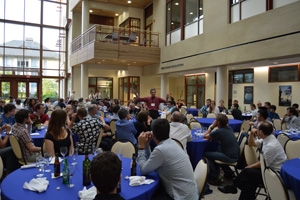On Campus
AU Department of Mathematics and Statistics Hosted SampTA Conference

Imagine life without computers, cell phones, televisions, radios, MRIs, EKG and EEG scans, or GPS systems.
None of these would exist without the mathematical process called sampling. Sampling Theory is one of the foundations of modern information theory. Everything that gathers, transmits and/or stores information uses this theory, from cell phones to computers to satellite images to medical imaging. We all benefit from this theory thousands of times every day.
Last year, AU hosted the 11th biennial SampTA (Sampling Theory and Applications) conference, a biennial interdisciplinary international conference for mathematicians, engineers, and applied scientists. The organizing committee included three members of the AU Mathematics and Statistics Department: Professor Stephen Casey (Chair), Assistant Professor Michael Robinson (Publications), and Professorial Lecturer Kevin Duke (Finances).
A Discipline at a Crossroad
Casey, who is currently editing a book about the conference and its findings, says the conference came at a critical time for the field of sampling. “Our wonderful discipline sits at a crossroad,” he said. “Just as mathematics and engineering used to be driven by mathematical physics, our mathematics and engineering will be motivated by the science of information.”
“This conference was a major event in the field of sampling,” he said. “It was only the second time that SampTA was held in the United States. It attracted more than 200 attendees from five continents, featured more than 130 talks, and produced 15 posters. The plenaries were delivered by some of the leading information theory scientists in the world.”
The meeting was endorsed by the Institute of Electrical and Electronics Engineers and the Society for Industrial and Applied Mathematics and received grant support from the Air Force Office of Scientific Research and the Army Research Office. The Conference Proceedings were published in IEEE XPlore.

